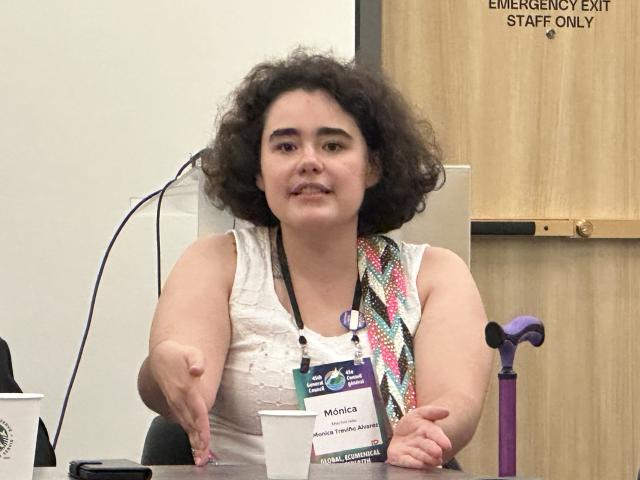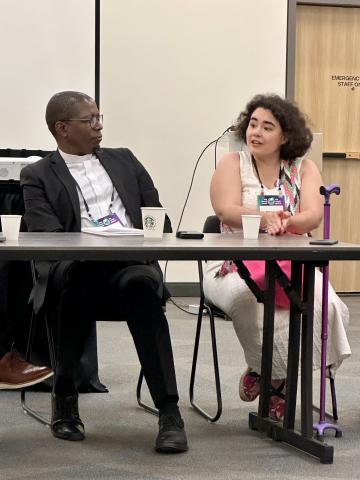At General Council 45, Mónica Treviño Álvarez of the World Student Christian Federation saw a room full of hope for 2S and LGBTQIA+ justice.

I am grateful to have this summer had the opportunity to attend and participate in the just-concluded 45th General Council of The United Church of Canada in Calgary, Alberta, and to represent the World Student Christian Federation in Latin America and the Caribbean (FUMEC-LAC) as one of a diverse group of ecumenical, global, and interfaith guests.
I engaged at GC45 among co-participants as a young lesbian woman living with an autoimmune disease. My body carries many layers of systemic oppression. How do you live out your faith when you are told that God condemns homosexuality? How do you see yourself as a believer when you are told that Lupus is the “demon of lesbianism”?
Sadly, churches remain the first place where we encounter violence, discrimination, and stigma. For many, the only option has been to leave our congregations—not because we stopped believing, but because of the intolerance and hatred within our churches.
Being part of the public apology to 2S and LGBTQIA+ communities by the United Church of Canada on August 8, 2025 was a moment of hope. Participating in the apology worship service felt like an act of justice. Witnessing a church with a systemic commitment to ending oppression is a sign of a Christianity that resists apathy and the influence of capitalism. And as we know, justice does not end with a single act—it demands constant commitment and everyday action.

During the 2S and LGBTQIA+ pre-event at GC45, I realized that both the FUMEC-LAC and The United Church of Canada share a common commitment to building a church, and a world, free from violence and discrimination against sexual and gender diversity. Joining together our hopes and continuing to work toward a more just and equal world is not just a dream—it is a real and achievable goal; one I am confident we will keep building together. I trust in God, and I firmly believe that the bonds of solidarity between our organizations will endure. This is only the first step.
As Regional Secretary of FUMEC-LAC and Coordinator of Identity, Dialogue and Gender Justice, I can only express my gratitude to The United Church of Canada for its deep commitment to gender justice. Being part of one of its global partners fills me with pride and hope.
I am convinced that both of our organizations will continue to seek the best ways forward, working for a world of respect and justice for queer people everywhere. Of course, the journey has been, and continues to be, long, and our contradictions persist. Even so, I am encouraged by the progress the church is making. My heart longs to witness an apology like the one I saw in Calgary in my home country of Mexico one day.
The World Student Christian Federation in Latin America and the Caribbean (FUMEC-LAC) is a United Church of Canada Mission and Service partner. Your support helps to accompany global partners like FUMEC, enabling vital visibility. The 2S and LGBTQIA+ Global Solidarity Fund supports international consultations with religious leaders, 2S and LGBTQIA+ communities, and sponsorships of LGBTQIA+ refugees to Canada. Make a gift today to help advance the rights of 2S and LGBTQIA+ people around the world.
—Mónica Treviño Álvarez is a young Mexican, and Regional Secretary of the World Student Christian Federation in Latin America and the Caribbean (FUMEC-LAC) and Global Program Coordinator.
The views contained within these blogs are personal and do not necessarily reflect those of The United Church of Canada.